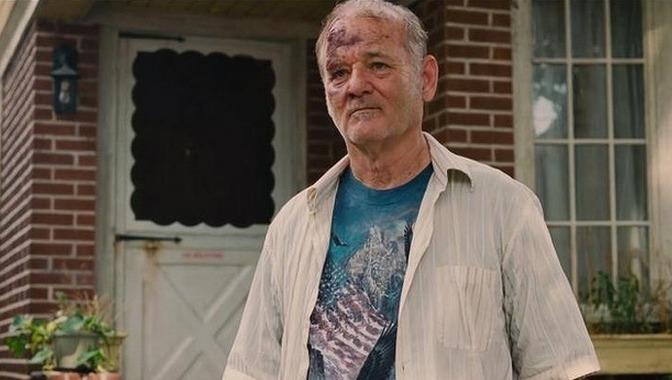First published on Daily Life, January 2015
Few instruments convey anger’s many shades as eloquently as Bill Murray’s face. In St Vincent, a new film that sees Murray play Vin – a hard-living Vietnam war vet forced to babysit Oliver (Jaeden Lieberher), the son of his next door neighbour (Melissa McCarthy), only to realise that his wide-eyed charge happens to hold the keys to his blackened heart – the 64-year-old actor’s sagging jowls and wrinkled forehead contort to reflect any number of emotional challenges: fury when his neighbour’s moving van backs into his fence and disrupts his booze-fuelled nap, belligerence when the bartender at the dive he frequents cuts him off, mild irritation when he’s rejected for withdrawing money to service his gambling debt, apathy when Oliver makes a speech at his school assembly explaining why his tantrums are a front for a goodness that qualifies him as a living saint.
But the talent for facial gymnastics that’s made Murray the most universally-adored actor of his generation has nothing to do with what might be his most convincing trick. The more dangerously unhinged his character is, the more pleasure we take in watching him on-screen.
Hollywood can’t get enough of the lovable grouch. Whether it’s Jack Nicholson’s acerbic novelist in As Good As It Gets, Clint Eastwood’s racist vigilante in Gran Torino or Murray’s curmudgeonly drifter in St Vincent, these leathery anti-heroes – by combining behaviour that’s borderline abusive with the flashes of kindness you just know are a sign of the good men they are inside – manage to pull at our heartstrings. It’s irrelevant that Nicholson’s Melvin Udall tells a fan he writes female characters by “taking away reason and accountability,” Eastwood’s Walt Kowalksi shoos his South Asian neighbours off his lawn with rifle in between slurs like “swamp rat” and “egg roll”, and Murray’s Vin spends babysitting dates gambling at the racetrack while Oliver’s single mother works double-shifts. Although the lovable grouch redeems himself eventually, he owes his power to the fact that his contemptible behaviour passes as endearing quirk.
This might feel like a modern-day phenomenon, but it’s easy to blame it on Dickens. The Christmas Carol‘s Ebenezer Scrooge, the miser who changes his crotchety ways thanks to a wake-up call from Tiny Tim, isn’t just the blueprint for every lovable grouch in modern cinema – it’s also a reason we crave watching broken men morph into people worth loving.The New York Times’ Manohla Dargis attributes the trope’s appeal to the rewards of watching a character curb damaging tendencies to become the man he was all along. “The scrooge is a particularly durable type, because his struggle is with his own self, and because his transformation has the feeling of a revelation even as it’s also hard won,” she writes.
But sometimes revelation and manipulation can go hand-in-hand. Witnessing Melvin declare his love for Caroll (Helen Hunt) the waitress he once terrorised, Walt take on the violent gang that threaten the neigbours he’s shown venom mixed with grudging acceptance, and a post-stroke Vin surrender to the affection of those around him is rewarding because it makes a self-destructive history feel worthwhile. The lovable grouch reflects a culture in which men are rewarded for shaking off dysfunctional behaviour rather than being kind and empathetic from the start. It’s nice to know that the number of times you cross the line is proportional to the extent to which you’re loved, accepted and celebrated.
In August 2013, author Claire Messud ran into trouble when she wrote a female version of the lovable grouch. “How angry am I? You don’t want to know. Nobody wants to know about that,” spits Nora Eldridge, the 42-year-old protagonist of The Women Upstairs, a novel concerned with the way one women’s simmering fury spills over every part of her life. When asked by a reporter from Publisher’s Weekly if she’d ever want to be friends with a character with such a grim outlook, she retorted with “The relevant question isn’t ‘Is this a potential friend for me?’ but ‘Is this character alive?”‘.
Women who fall apart at the seams in a way that affects everyone around them are still more likely to be seen as hysterical shrews than likable oddballs with hearts of gold. But in a film starring a cantankerous grandmother who hurls insults at the neighbours in between booze-fuelled naps? That would be truly pleasurable to watch.
